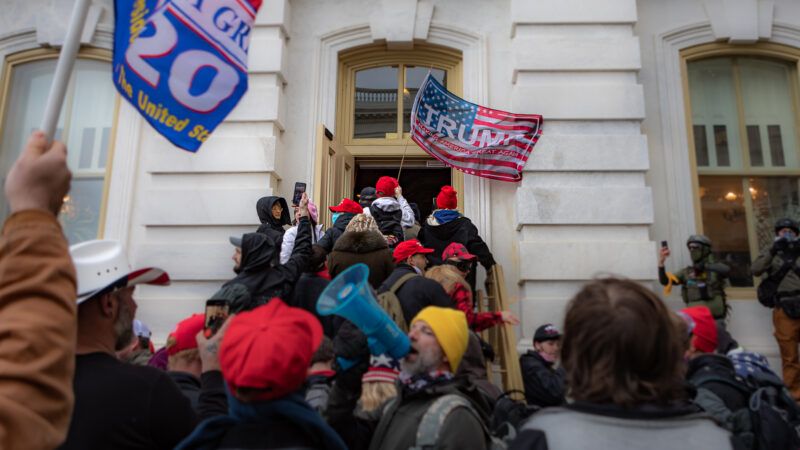Don't Make Every Day January 6
The Capitol riot was awful, but it shouldn't serve as an excuse to violate civil liberties.

Today is the one-year anniversary of the Capitol riot: On January 6, 2021, hundreds of President Donald Trump's most militant supporters overran the police, smashed the windows of the building, and forced their way inside. They vandalized congressional offices and halted the certification of Joe Biden's win.
It was an embarrassing spectacle, and one for which Trump bears significant responsibility. Not antifa, not Democrats, not the deep state, but Trump. For weeks, he had made false statements about the election outcome and asserted his loss was illegitimate. He fed his voters lies and promised them that the results could be overturned—perhaps by the Supreme Court, perhaps by Vice President Mike Pence. On January 6, he spoke to the crowds in Washington, D.C., and told his supporters "we will never give up, we will never concede." He said "we will stop the steal," and encouraged his people to march to the Capitol and "give our Republicans…the kind of pride and boldness that they need to take back our country."
What followed was certainly bold: Among the thousands gathered, a smaller number stormed the Capitol and trashed it. The incident was so humiliating and seemingly counterproductive that many conservative media figures firmly entrenched in MAGA world privately reached out to Trump to demand that he stop it while it was happening. Indeed, members of Trump's own family were concerned: Donald Trump Jr. texted his father's chief of staff, Mark Meadows, and begged him to ask the president to denounce the out-of-control violence and destruction. They all knew—or at least, they presumed—that mob violence, stoked by Trump, would destroy his legacy and prevent him from ever running for president again.
That prediction has proven to be wrong. One year later, Trump still enjoys tremendous support from the Republican Party. Many Republican figures who condemned the rioting, on the other hand, have paid a steep price.
So this is something https://t.co/CfrhwNjmnL pic.twitter.com/SidaYWfgm5
— David Byler (@databyler) January 5, 2022
Certainly, the McConnells and Pences of the world would have preferred for Trump to go away voluntarily and quietly. He has refused to do so, and has given every indication that he will run again in 2024.
The surest option for preventing him from returning to the Oval Office was conviction during his second impeachment trial, but the 57–43 vote in the Senate (which did attract some Republican support) fell 10 votes short. A conviction for inciting the riot would have correctly located significant responsibility for the chaos where it belonged—with Trump.
Alas, this did not happen. Instead, the U.S. House of Representatives convened a select committee—the U.S. House Select Committee to Investigate the January 6th Attack on the United States Capitol—that continues to search for new answers and information, and seeks to question figures like Steve Bannon, Devin Nunes, and Katrina Pierson, and also tangential figures from outside the administration, like Alex Jones and Roger Stone. By demanding testimony and records from people who were not government figures at the time of the riot—and had the First Amendment right to organize peacefully in opposition to the election results—the committee's work should be of increasing concern to civil libertarians. In any case, there is no mystery to solve: Trump should have been held accountable, but given the failed Senate vote to convict, there's nothing more to be done.
As for the individuals who entered the Capitol and engaged in property destruction, they should face charges that are in line with their actual crimes. Like Trump, they should be held responsible for their actions. But on this front, many Democratic politicians (unlike the Department of Justice as it weighs sentences) have given every indication of following a post-9/11 script, treating the criminals as not mere vandals but as domestic terrorists of a sort. Senate Majority Leader Chuck Schumer (D–N.Y.), for instance, called on the Department of Homeland Security to add January 6 protesters to the no-fly list, a "civil liberties nightmare," as Reason's C.J. Ciaramella explained at the time. Some January 6 detainees have been held in jail awaiting trial for months, subjected—in some cases—to solitary confinement for 23 hours each day.
Jacob Chansley, the "QAnon Shaman" whose horns and lack of a shirt drew the media's attention and made him the riot's de facto leader, was sentenced to 41 months in prison—after already spending 10 months in solitary confinement. Chansley had no real opportunity to prove his innocence in court. Faced with a potential 20-year sentence, he made the wise decision to plead guilty, as virtually all defendants do.
The events of January 6 were tragic and disturbing. It was beyond the pale for the sitting president to falsely contend that he won reelection and encourage his supporters in a violent fury that culminated in vandalism at the nation's Capitol. It's important not to understate the damage done by both the mob and by Trump himself.
But it's also important for the government to avoid overreaction. The 9/11 terror attacks inspired the Bush administration to launch a disastrous war on terror, invade sovereign nations, kill American citizens abroad and engage in routine surveillance of Americans domestically, and violate civil liberties in a dozen other far-reaching ways. Frustratingly, mainstream media outlets have given every indication that they would provide intellectual cover to any Biden administration effort to respond to January 6 in a similarly extreme way. "Every Day Is Jan. 6 Now," wrote the New York Times editorial board. Let's hope not.


Show Comments (501)